
Theoretical and Practical Issues of Journalism
Scope & Guideline
Empowering Researchers to Shape Journalism's Future
Introduction
Aims and Scopes
- Interdisciplinary Approaches to Journalism:
The journal emphasizes interdisciplinary perspectives, integrating insights from sociology, media studies, political science, and cultural studies to enrich the understanding of journalism as a social practice. - Ethics and Professional Standards:
A core focus is on the ethical dimensions of journalism, examining professional standards, ethical dilemmas, and the evolving nature of journalistic integrity in the digital age. - Impact of Technology on Journalism:
The journal explores the influence of emerging technologies, including artificial intelligence and digital platforms, on journalism practices, audience engagement, and content creation. - Cultural and National Contexts:
Research is often contextualized within specific cultural and national frameworks, particularly examining journalism's role in shaping national identity and cultural narratives. - Media Education and Professional Development:
The journal addresses journalism education, focusing on curriculum development, pedagogical approaches, and the preparation of future journalists for the evolving media landscape.
Trending and Emerging
- Digital Journalism and New Media:
A significant increase in studies related to digital journalism and new media platforms showcases the journal's responsiveness to the rapid evolution of media consumption and production practices. - Artificial Intelligence and Journalism:
Emerging discussions on the role of artificial intelligence in journalism underscore a growing interest in how AI technologies are transforming content creation, ethical considerations, and journalistic practices. - Cultural and Political Narratives:
There is an upswing in research focusing on how journalism shapes and is shaped by cultural and political narratives, particularly in the context of national identity and global events. - Social Media's Role in Journalism:
The journal increasingly addresses the impact of social media on journalism, exploring how platforms influence news dissemination, audience engagement, and the construction of public discourse. - Environmental Communication:
Recent publications indicate a rising interest in environmental communication within journalism, reflecting a broader societal focus on sustainability and climate-related issues.
Declining or Waning
- Historical Analysis of Journalism Practices:
While historical perspectives have been a staple in journalism studies, recent issues indicate a reduced emphasis on historical analysis, shifting towards contemporary and forward-looking discussions. - Traditional Media Formats:
There is a noticeable decline in research focused on traditional media formats, such as print journalism, as the journal pivots towards digital media and new communication technologies. - Local Journalism Challenges:
Coverage of local journalism issues, including the specific challenges faced by regional newspapers, appears to be less frequent, possibly overshadowed by broader global or national media trends. - Media Regulation and Policy:
Discussions surrounding media regulation and policy have diminished, suggesting a potential shift in focus towards more immediate and practical issues faced by journalists in the digital age. - Audience Reception Studies:
Research on audience reception and media consumption patterns has decreased, indicating a trend away from understanding audience dynamics in favor of content production and technology impacts.
Similar Journals

Revista Mediterranea Comunicacion-Journal of Communication
Fostering Global Discourse in CommunicationRevista Mediterranea Comunicacion - Journal of Communication, published by UNIV ALICANTE, stands as a significant platform for scholars and practitioners in the fields of Communication and Cultural Studies. With an impact factor that firmly places it in Q2 for Communication and Q1 for Cultural Studies, this open-access journal promotes scholarly dialogue through a rich array of articles, encouraging international discourse that spans various cultural and communicative phenomena. Since its inception in 2010, the Revista Mediterranea Comunicacion has made substantial contributions to understanding contemporary communication dynamics, supported by a growing reputation evidenced by its commendable Scopus rankings—144th in Cultural Studies and 181st in Communication. Researchers, professionals, and students are invited to explore and contribute to this journal, further enhancing the understanding of communication within diverse social contexts.
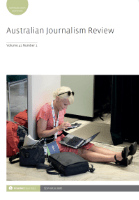
Australian Journalism Review
Unpacking the Dynamics of Contemporary JournalismAustralian Journalism Review, published by INTELLECT LTD, is a leading academic journal that focuses on the dynamic field of journalism and communication. With the ISSN 0810-2686 and E-ISSN 2517-620X, this journal has established itself as a significant contributor to understanding contemporary journalism in Australia and beyond. It boasts a respectable Q2 ranking in the Communication category for 2023, positioning it among the top journals in its field, with a Scopus rank of #273 out of 511 in Social Sciences Communication, reflecting its growing impact within academic and professional circles. The journal’s scope includes critical analyses of journalism practices, media policy, and the evolving roles of journalists in society, making it an essential resource for researchers, professionals, and students interested in the intersection of media, ethics, and culture. Although it does not currently offer open access, interested audiences can find valuable insights from its converged issues, spanning from 2003 to 2024, allowing for a comprehensive view of the progression and transformation of journalism studies.
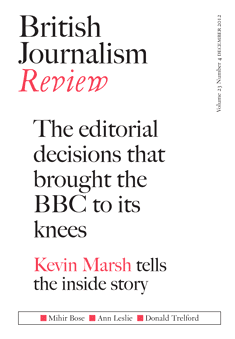
British Journalism Review
Navigating the Evolving Landscape of NewsBritish Journalism Review is a distinguished academic journal dedicated to the exploration and analysis of the rapidly evolving field of journalism. Published by SAGE Publications Ltd, this journal plays a critical role in disseminating high-quality research that addresses key issues facing journalists and media organizations today. With an ISSN of 0956-4748 and an E-ISSN of 1741-2668, it is a pivotal resource for scholars, practitioners, and students alike. Although the journal does not currently offer Open Access options, it maintains a strong commitment to academic rigor and innovation in journalism studies. By engaging with a diverse range of topics such as media ethics, the impact of digital technologies, and the changing landscape of news consumption, the British Journalism Review remains instrumental in shaping contemporary debates and enhancing the scholarly discourse in its field.

Journalism Studies
Illuminating Ethical and Technological Dimensions in NewsJournalism Studies is an esteemed academic journal dedicated to advancing the field of media and communication, and it has established itself as a leading platform for innovative research in this dynamic discipline. Published by Routledge Journals, Taylor & Francis Ltd, this journal boasts an impressive Q1 ranking in Communication in 2023, reflecting its significant impact and contributions to the field, currently holding a Scopus rank of 64 out of 511 in Social Sciences Communication, placing it in the 87th percentile. Covering a rich spectrum of topics from journalism ethics to the role of technology in news dissemination, Journalism Studies aims to foster scholarly debate and provide critical insights that shape the future of journalism. With ongoing research spanning from 2001 to 2024, it serves as an essential resource for researchers, professionals, and students seeking to enhance their knowledge and engage with contemporary issues in journalism. For those looking to stay at the forefront of media studies, this journal represents a vital source of quality research and scholarly dialogue.
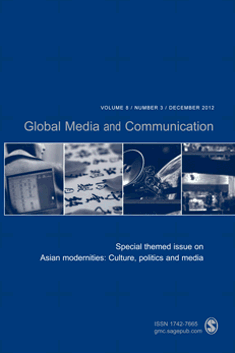
Global Media and Communication
Advancing Insights into Global Media DynamicsGlobal Media and Communication is a premier journal dedicated to advancing the fields of media and communication studies, published by SAGE Publications Ltd. With an ISSN of 1742-7665 and an E-ISSN of 1742-7673, this journal offers a platform for scholarly discourse and innovative research that explores the intricate relationships between global media practices and communication strategies. Recognized as a Q1 journal in both the Arts and Humanities (Miscellaneous) and Communication categories for 2023, it stands out in its commitment to delivering high-quality, peer-reviewed articles that contribute to the understanding of contemporary media landscapes. Located in London, United Kingdom, the journal benefits from being at the heart of cultural and digital innovation. Researchers, professionals, and students can look forward to insightful articles that not only critique existing frameworks but also propose new methodologies, ensuring that Global Media and Communication remains a vital resource for anyone interested in navigating the evolving dynamics of media and communication on a global scale.
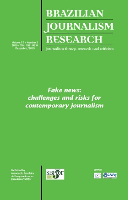
Brazilian Journalism Research
Advancing Knowledge in Communication StudiesBrazilian Journalism Research is a leading platform in the field of communication studies, focusing on the dynamic landscape of journalism in Brazil and beyond. Published by SBPJOR, this open-access journal has been committed to scholarly dissemination since 2005, facilitating a diverse array of research that informs both academic and professional practices. With an ISSN of 1808-4079 and an E-ISSN of 1981-9854, the journal explores critical issues within journalism, including media practices, policy analysis, and the social implications of news dissemination. Recognized in the Q3 quartile of Communication as per 2023, it ranks 324 out of 511 in the Scopus social sciences communication category, highlighting its growing reputation amidst an evolving field. The journal's commitment to quality research is further exemplified through its converged years from 2018 to 2024, which enables it to analyze contemporary trends and future directions. Researchers, professionals, and students alike are encouraged to access this journal to enrich their understanding and engagement with Brazilian journalism scholarship.
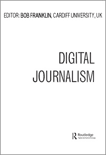
Digital Journalism
Exploring Innovations at the Intersection of Technology and JournalismDigital Journalism is an esteemed academic journal dedicated to advancing the interdisciplinary field of digital communication and journalism. Published by Routledge Journals, Taylor & Francis Ltd, this journal has established itself as a leading resource with a noteworthy Q1 rank in Communication for 2023, placing it among the top tier of journals in this dynamic field. With its ISSN 2167-0811 and E-ISSN 2167-082X, it serves as a pivotal platform for researchers, professionals, and students interested in exploring the intersection of technology and journalism, publishing insightful studies that address contemporary challenges and innovations. The journal has been continually evolving since its inception in 2013 and is set to extend its reach until 2024, consistently attracting high-quality scholarly contributions. With a distinguished rank of 11 out of 511 in Scopus's Social Sciences - Communication category, and boasting an impressive 97th percentile, Digital Journalism is an essential read for anyone keen on understanding the future of news in the digital era.

IC-Revista Cientifica de Informacion y Comunicacion
Cultivating Excellence in Information and Communication ResearchIC-Revista Cientifica de Informacion y Comunicacion, published by UNIV SEVILLA, EDITORIAL, stands at the forefront of academic discourse in the fields of Communication, Cultural Studies, Library and Information Sciences, and Linguistics and Language. With its ISSN 1696-2508 and E-ISSN 2173-1071, this esteemed journal showcases high-quality research, contributing significantly to the advancement of knowledge since its inception in 2016. The journal is recognized for its rigorous standards, holding a Q2 category in Communication, a Q1 category in Cultural Studies, as well as Q2 rankings in both Library and Information Sciences and Linguistics and Language as of 2023. With a growing reputation, it is ranked in the mid percentiles across various Scopus categories, marking it as a key player in its spheres of influence. Although not an open-access journal, it remains accessible through institutional subscriptions, making it a vital resource for scholars and practitioners alike. The editorial team is dedicated to fostering innovation and engagement within the academic community, aligning with the evolving dynamics of information and communication.
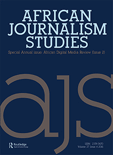
African Journalism Studies
Championing research that shapes the future of African journalism.African Journalism Studies is a leading journal dedicated to advancing the field of journalism research within the African context. Published by Routledge Journals, a prestigious division of Taylor & Francis Ltd, this journal features a rich repository of scholarly articles that explore critical issues in journalism, media practices, and communication strategies across the continent. With an impressive Q2 ranking in Communication for 2023, African Journalism Studies is recognized for its influence and quality, ranking #202 out of 511 journals in social sciences communication and maintaining a 60th percentile position. Despite being a non-open access publication, it remains essential for researchers, professionals, and students looking to deepen their understanding of the dynamics of journalism in Africa, offering insights into converged media practices from 2015 to 2024. The journal contributes significantly to the academic discourse, fostering a more profound knowledge base and encouraging informed discussions that reflect the evolving landscapes of African journalism.

Analisi-Quaderns de Comunicacio i Cultura
Empowering voices in the realm of culture and communication.Analisi-Quaderns de Comunicacio i Cultura, published by Universitat Autònoma de Barcelona, is a distinguished open-access journal that has been serving as a pivotal platform for interdisciplinary research in Communication and Cultural Studies since its inception. With an ISSN of 0211-2175 and E-ISSN 2340-5236, this journal not only contributes significantly to its fields, as evidenced by its impressive rankings—Q2 in Communication and Q1 in Cultural Studies for 2023—but also boasts strong Scopus placements, including a rank of 181 out of 1304 in Cultural Studies. The journal's commitment to open access since 2010 ensures that research findings are readily available to a global audience, fostering collaboration among scholars, practitioners, and students. Located in Cerdanyola del Vallès, Barcelona, this publication invites contributions that explore the dynamic and rapidly evolving intersections of culture and communication, making it an essential resource for those seeking to advance knowledge and engage critically in these essential areas of study.